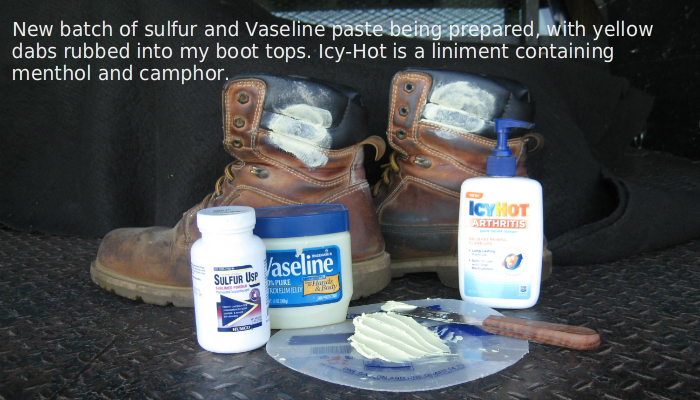Manage Ticks This Summer

Last year I offered my method for avoiding getting bit by deer flies: Looking to Outmaneuver Deer Flies and it worked 100% for me in 2016. If you found the information helpful, you might also be interested in my tick management procedures. Most years I also manage to avoid getting ticks on me, and I’ve found these three things seem the most important:
- Crawling around in bushes: I try to do these projects during the winter half of the year.
- Mask my scent: I try to mask my scent – especially near ground level. Every few years I stir up a little batch of a paste made by mixing some Vaseline into finely powdered sulfur. Small dabs of this paste are rubbed into my summer boot tops every few days or so. I also rub in a bit of a strong liniment containing menthol and camphor or eucalyptus oil (see photo). Do not get the liniment in your eyes.
- Avoid lying directly in the grass: During the summer months, I use cardboard, plywood, a sheet, or beach blanket to lie on. This will also help keep off chiggers, which are relatives of the ticks. And follow up with a hot soapy shower.
Folklore says that ticks jump out of the bushes onto you, but I doubt this for several reasons. Their stubby little legs sticking out to the side are not designed at all like grasshoppers or crickets. Instead, ticks perch on the tips of grass blades or leaves, waiting for a passerby to brush against them and they can latch on. I have teased them there with a long pine needle and they will walk the needle toward my hand, but I’ve never seen one jump. This may seem inefficient for the tick to just wait, but the Kaufman Field Guide to Insects of North America says that, “Ticks are capable of waiting years, perhaps even decades, for an appropriate host to come within reach…” This makes it seem much more likely that they will succeed.
I think that a tick perched out on a leaf blade must have some mechanism to distinguish between a mammal brushing past, and leaves and twigs brushing back and forth in the wind. My guess is that their clue is odor. Powdered sulfur has no odor itself, but it reacts slowly and steadily with oxygen to produce sulfur dioxide gas, which reacts with the water in your nose to create a trace of sulfuric acid, creating a sharp tingly smell. This is the odor of brimstone and volcanism, and not of mammals. Likewise, menthol, camphor, and eucalyptus have a strong penetrating odor not produced by us mammals. These were selected for masking human odor because I’m guessing that a waiting tick has to make an instantaneous decision whether to reach out and grasp; and if the object doesn’t smell like a mammal, the decision is probably no.
These are easy things to try. If you are out with a group, turn it into an experiment, with half of you with sulfur and menthol, and half not.
Tags: Lon Drake, ticks

